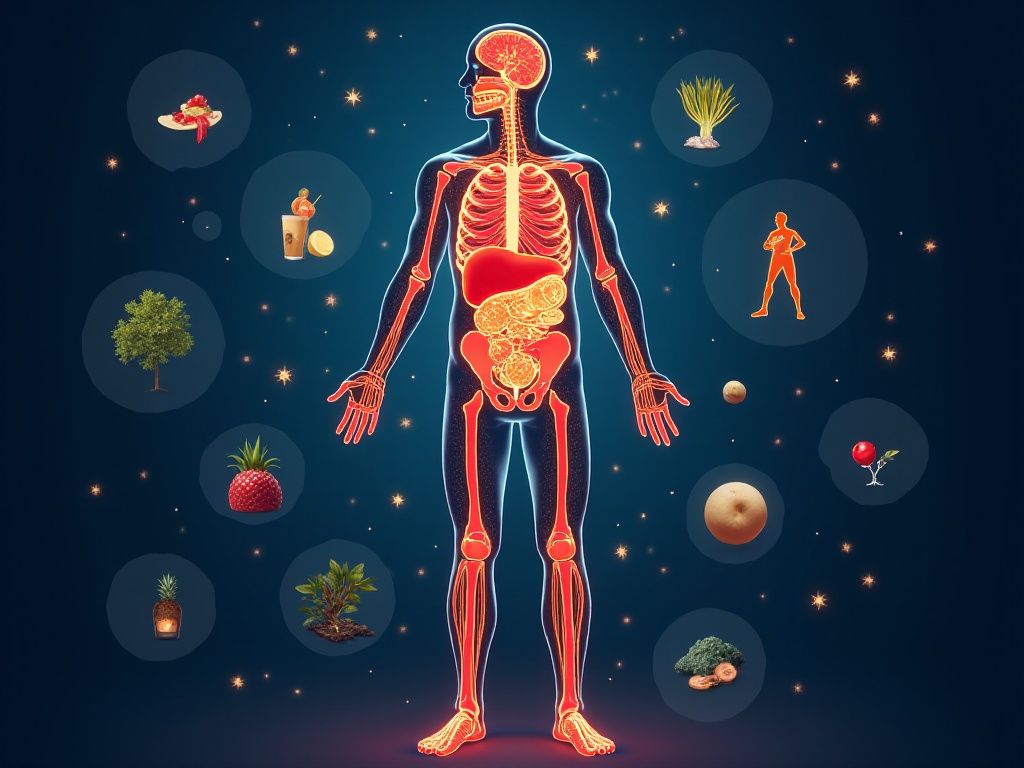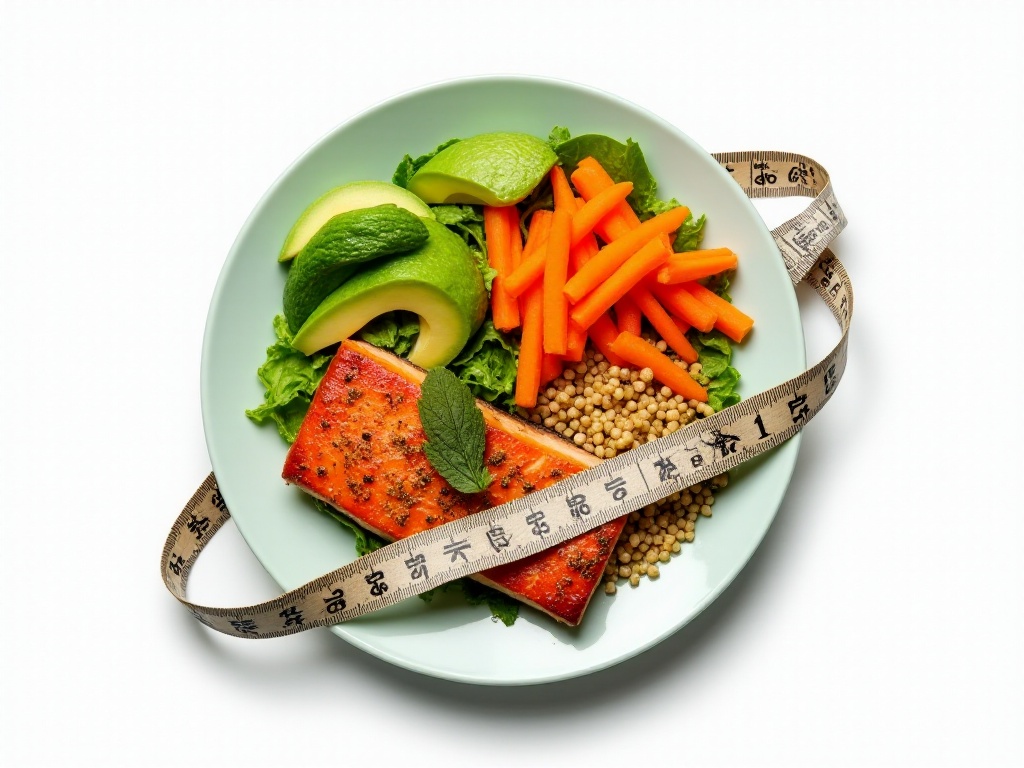Introduction
Recently, I've noticed many of my post-90s friends starting to pay attention to healthy eating. As a food blogger specializing in nutrition for many years, I want to share some practical dietary advice. During my decade-plus career in nutrition research, I've interviewed numerous nutrition experts, participated in various dietary health research projects, and accumulated extensive practical experience. Through long-term observation and data analysis, I've gained a deep understanding of the dietary challenges and confusion faced by young people.
Modern life is fast-paced with high work pressure, and many young people often overlook the importance of healthy eating. Fast food, takeout, and snacks have become the main characters in daily diets, which will inevitably have adverse effects on health in the long run. However, it's encouraging to see that more and more post-90s individuals are becoming aware of this issue and actively seeking change.
Nutritional Balance

Dietary Fiber
When it comes to healthy eating, many people's first reaction is to "eat less." This idea isn't entirely correct. The key isn't eating less, but eating right. Nutrition experts suggest that one-third of our diet should consist of whole grain foods. Whole grains not only contain abundant dietary fiber but are also rich in B vitamins, vitamin E, minerals, and other nutrients.
I remember when I first started adjusting my diet structure last year, I began with breakfast. Instead of just grabbing whatever was convenient, I now prepare a bowl of oatmeal with blueberries and nuts. This combination is not only delicious but also gives you a full sense of energy. The β-glucan in oats helps stabilize blood sugar levels, blueberries are rich in antioxidants, and nuts provide quality protein and healthy fats.
Increasing whole grain intake in daily diet isn't difficult. For example, you can choose whole wheat bread instead of white bread, brown rice instead of white rice. I personally highly recommend quinoa, a superfood from South America that not only contains abundant dietary fiber but also provides complete protein. Quinoa can be used in salads, porridge, or even as a rice substitute.
Many people might ask: Why emphasize whole grains? Because refined flour loses a lot of dietary fiber and nutrients during processing. Imagine your intestines as a pipeline that needs cleaning, and dietary fiber is the best cleaner. Adequate fiber intake not only promotes intestinal peristalsis and prevents constipation but also helps maintain healthy gut flora and enhance immunity.
Studies show that people who consume 25-35 grams of dietary fiber daily have significantly lower risks of cardiovascular disease and colorectal cancer. However, the reality is that most young people's fiber intake is less than half the recommended amount. Therefore, consciously increasing whole grain intake is particularly important.

Sugar and Fat Control
Speaking of sugar control, I have a small story to share. I used to love bubble tea and would order one almost every day. Until one day when I calculated that one cup of bubble tea contains sugar equivalent to 8 sugar cubes. This number shocked me. The World Health Organization recommends that adults should not consume more than 25 grams of added sugar per day, and one cup of bubble tea exceeds this limit.
Excessive sugar intake not only leads to weight gain but also increases the risk of diabetes and cardiovascular diseases. More importantly, sugar accelerates cellular aging, causing skin to lose elasticity and accelerating wrinkle formation. Therefore, controlling sugar intake is particularly important for post-90s individuals who want to maintain their youth.
In practice, I've found that gradually reducing sugar intake is the most effective method. You can start by reducing sugary drinks, replacing sodas and bubble tea with water and sugar-free tea beverages. When baking, try using the natural sweetness of fruits to replace some sugar. For example, using ripe bananas in cakes not only reduces sugar usage but also increases nutritional value.
As for fat control, the key is choosing healthy fat sources. Olive oil, nuts, and avocados are good sources of quality fats. The unsaturated fatty acids in these foods are beneficial for cardiovascular health and help maintain skin elasticity. However, even healthy fats should be consumed in moderation, as fats have higher caloric density than carbohydrates and proteins.
Nutrition experts recommend that adults should not consume more than 6 grams of salt per day. But did you know that one package of instant noodles contains nearly 4 grams of salt? Excessive salt intake leads to water and sodium retention, increases cardiac burden, and causes facial swelling. So now when I cook noodles, I reduce the amount of seasoning packets and use fresh herbs instead. Rosemary, thyme, basil, and other herbs not only add flavor but also have antioxidant properties.
For cooking methods, I recommend using healthier techniques like steaming, boiling, and stewing, while reducing frying. If frying is necessary, choose oils that can withstand high temperatures, such as peanut oil or sunflower oil. Keep cooking temperature below 180 degrees Celsius to reduce the formation of harmful substances. Additionally, you can use an air fryer to make traditional fried foods, maintaining flavor while greatly reducing oil usage.
Nutritional Supplements

Essential Nutrients
A balanced diet should include vegetables and fruits of various colors. I particularly like using the concept of a "rainbow plate" to plan my meals. Different colored vegetables and fruits contain different nutrients, and by consuming foods of various colors, we can ensure nutritional diversity.
Purple foods like eggplants, purple cabbage, and blueberries are rich in anthocyanins, which have powerful antioxidant effects, can delay aging, and protect cardiovascular health. Red foods like tomatoes, red peppers, and watermelon are rich in lycopene, which protects prostate health and prevents certain cancers. Green vegetables like broccoli, spinach, and asparagus are rich in folic acid and vitamin K, crucial for bone health and blood clotting.
Yellow foods like corn, pumpkin, and carrots are rich in carotenoids, which can convert to vitamin A, important for vision health and immune system function. White foods like tofu, mushrooms, and garlic are rich in protein and sulfur compounds, which enhance immune function.
In practice, I recommend consuming at least 500g of vegetables and 200g of fruits daily. Vegetables can be distributed across two to three meals, with a vegetable-fruit juice for breakfast and a salad for lunch and dinner. Fruits are best consumed between meals as snacks, providing nutrition while preventing overeating due to hunger.
Supplementation
Regarding supplements, many friends have been asking me whether they should take multivitamins. There's actually no standard answer to this question; it mainly depends on your dietary structure. If you can ensure adequate intake of vegetables and fruits regularly, you might not need additional supplements. However, certain groups, such as office workers who often work late, vegetarians, and women, may need appropriate supplementation of specific nutrients.
Vitamin D is one nutrient commonly deficient in modern people. Due to long indoor working hours, many people lack sufficient sun exposure, leading to insufficient vitamin D synthesis. Vitamin D is crucial for calcium absorption and bone health, and also participates in immune system regulation. If conditions allow, it's recommended to spend 15-30 minutes outdoors daily, allowing skin to receive adequate sunlight.
Iron is another nutrient that needs attention, especially for women. Blood loss during menstruation leads to iron loss, and insufficient supplementation can easily cause anemia. Iron-rich foods include lean meat, animal organs, and dark green leafy vegetables. Note that tannins in tea can affect iron absorption, so it's recommended to wait 1-2 hours after meals before drinking tea.
Omega-3 fatty acids are essential fatty acids important for brain development and cardiovascular health. If you're not vegetarian, it's recommended to eat deep-sea fish 2-3 times per week. Salmon and tuna are good choices. For vegetarians, omega-3 can be supplemented through plant-based foods like flaxseeds and chia seeds.
Calcium supplementation is also important, especially for young people who love coffee and carbonated drinks. These beverages can affect calcium absorption and utilization. Besides dairy products like milk and yogurt, soy products, dried small fish, and dark green vegetables are also good sources of calcium. To promote calcium absorption, it's recommended to supplement with vitamin D simultaneously.
When choosing nutritional supplements, pay attention to the following points: First, choose products from reputable manufacturers; second, don't blindly pursue high doses, moderate supplementation is key; finally, it's best to supplement under the guidance of a doctor or nutritionist to avoid nutrient excess or adverse reactions.

Exercise and Health

Exercise Plan
Many people think exercise means going to the gym to lift weights. Actually, a 30-minute brisk walk daily is a great form of exercise. I've developed the habit of walking after work, which helps both relax the mind and maintain physical health. Moderate aerobic exercise can promote metabolism, help burn excess calories, and improve cardiopulmonary function.
For office workers, prolonged sitting is a common problem. Long-term sedentary behavior can lead to muscle atrophy, osteoporosis, and increase the risk of cardiovascular disease. It's recommended to get up and move for 5-10 minutes every hour of work, doing simple stretching exercises or marching in place.
Besides aerobic exercise, appropriate strength training is also important. Strength training can increase muscle mass, raise basal metabolic rate, and help maintain a healthy weight. You don't necessarily need to go to the gym; simple strength training exercises like push-ups, squats, and planks can be done at home.
Yoga is another recommended form of exercise. Yoga not only increases body flexibility but also helps relieve stress and improve sleep quality. Many yoga apps now offer online courses, and you can choose suitable courses based on your time and level.

Body Monitoring
Speaking of monitoring, the scale is the simplest tool. However, don't be too fixated on numerical changes. What's important is paying attention to your physical and mental state. Besides weight, waist circumference is also an important health indicator. Studies show that every 5cm increase in waist circumference significantly increases the risk of metabolic syndrome.
Many smart bands on the market now can monitor daily activity, heart rate, sleep quality, and other indicators. This data can help us better understand our physical condition and adjust our lifestyle accordingly. But don't overly rely on these data; the most important thing is listening to your body.
Regular physical examinations are also necessary. It's recommended to have a comprehensive physical examination at least once a year to understand changes in various body indicators. For people with special needs, more frequent checks may be needed. For example, people with family medical history may need to start screening for certain specific items earlier.
Final Thoughts
A healthy lifestyle isn't achieved overnight; it requires gradual progress. You can start by changing one small habit, like drinking warm water in the morning or eating an extra serving of fruit daily. Remember, in pursuing health, persistence is more important than immediate results.
Changing dietary habits may face various challenges, such as being too busy to prepare healthy food or finding it difficult to resist food temptations. This is normal; the key is not giving up the entire health plan because of temporary setbacks. You can set small goals for yourself and reward yourself upon completion, which helps maintain long-term motivation.
Nutrition is a constantly evolving field, and new research findings continue to emerge. It's recommended to maintain an open mind while also having critical thinking, and not blindly following nutrition trends. Most importantly, find a healthy lifestyle that suits you and can be maintained long-term.
Have you started paying attention to dietary health recently? Welcome to share your healthy living tips in the comments section. Let's encourage each other and progress together on the path to health.


